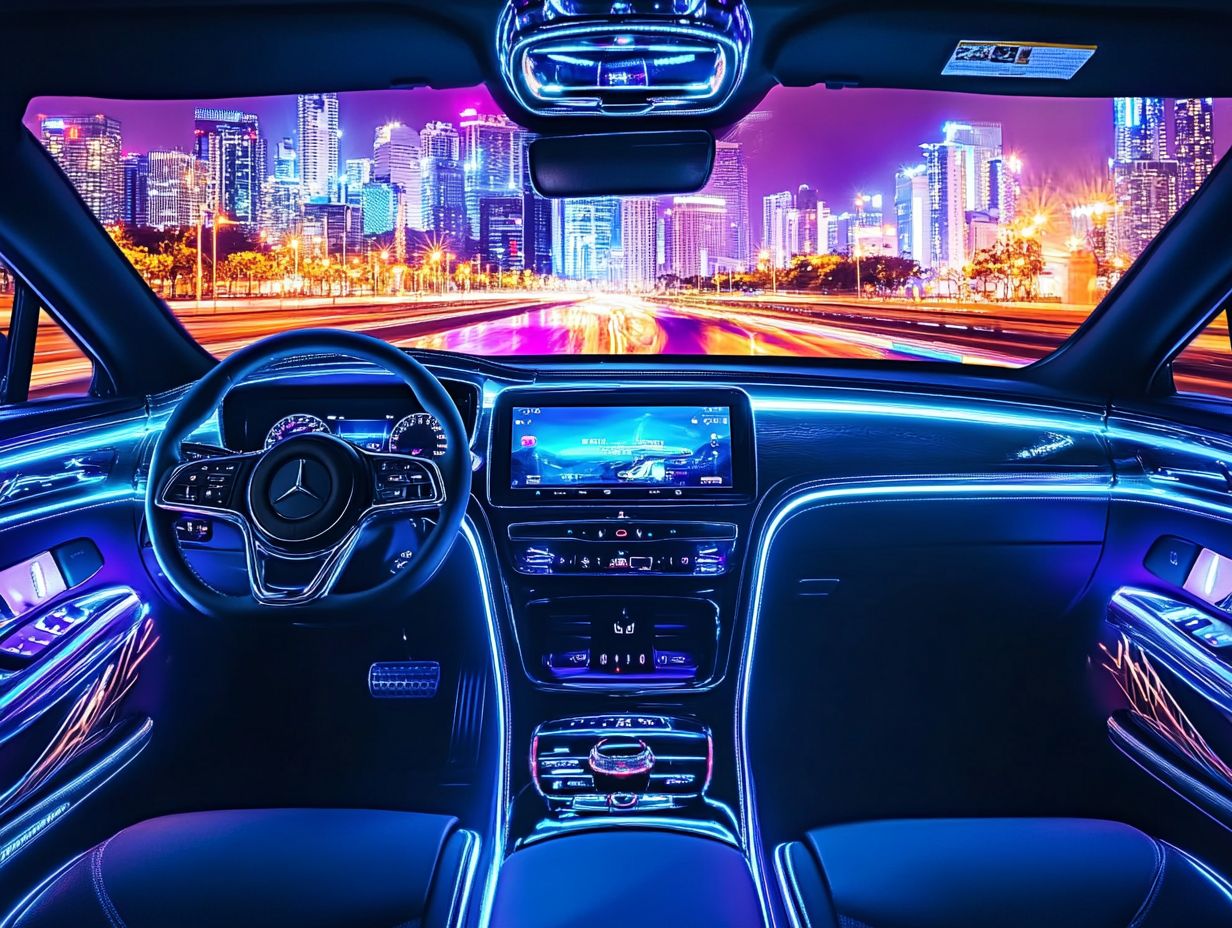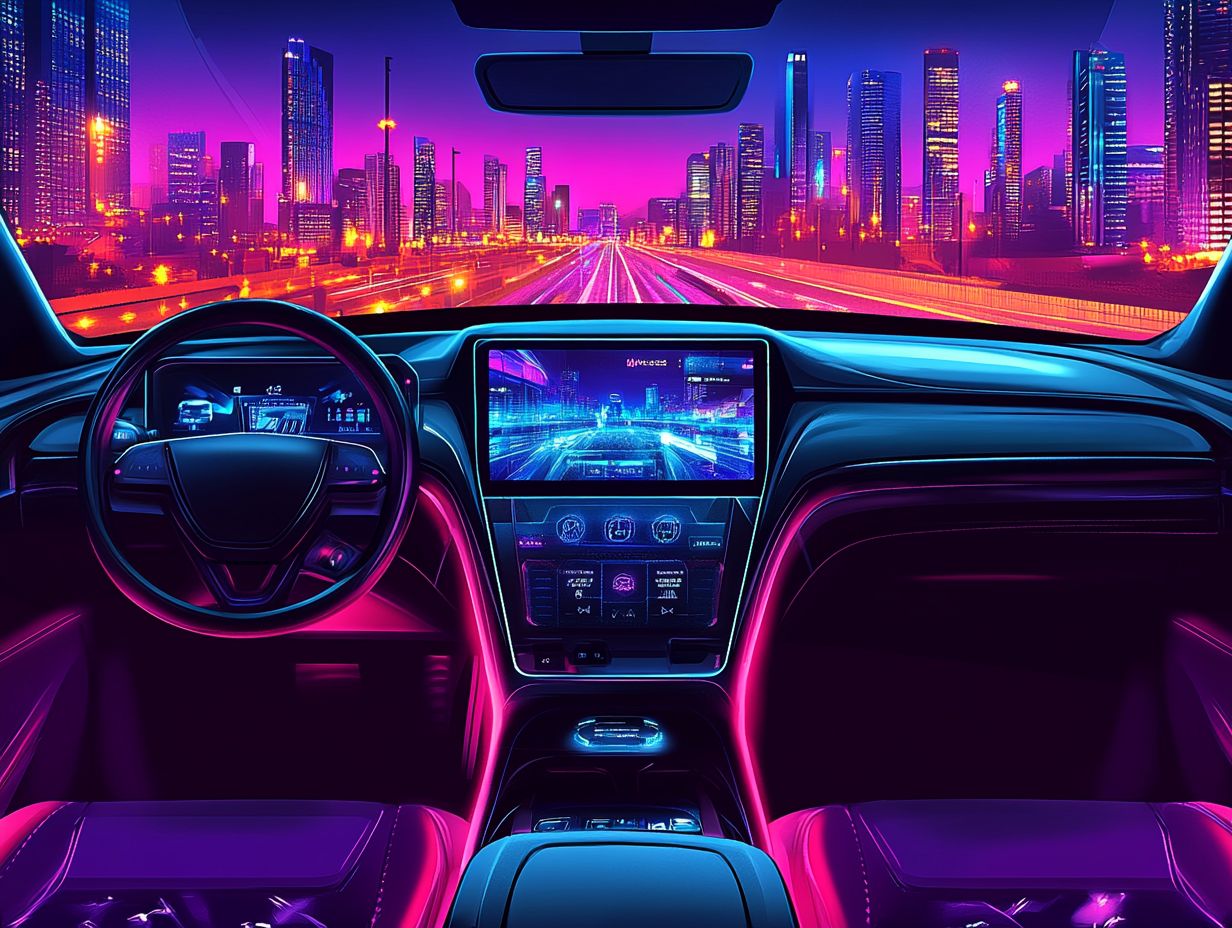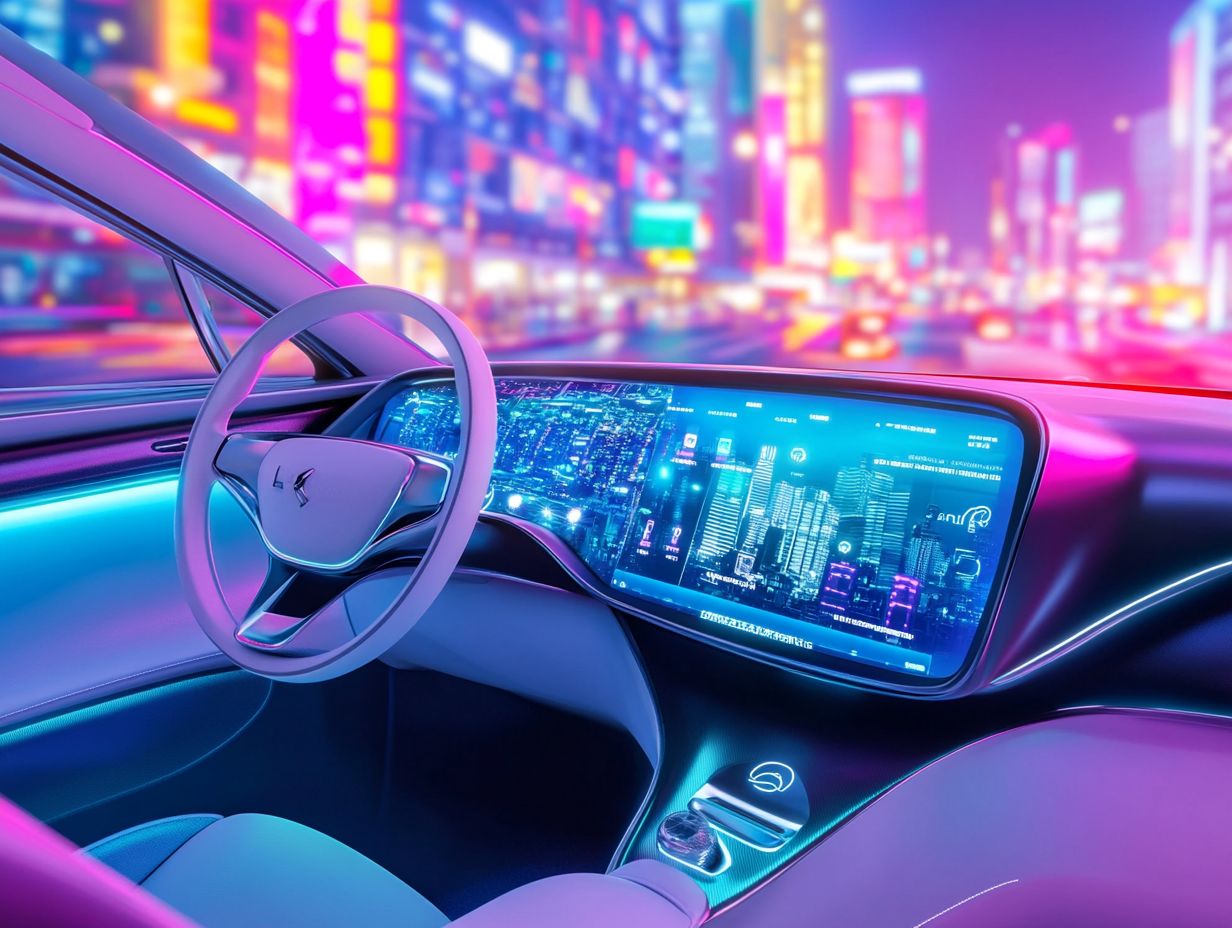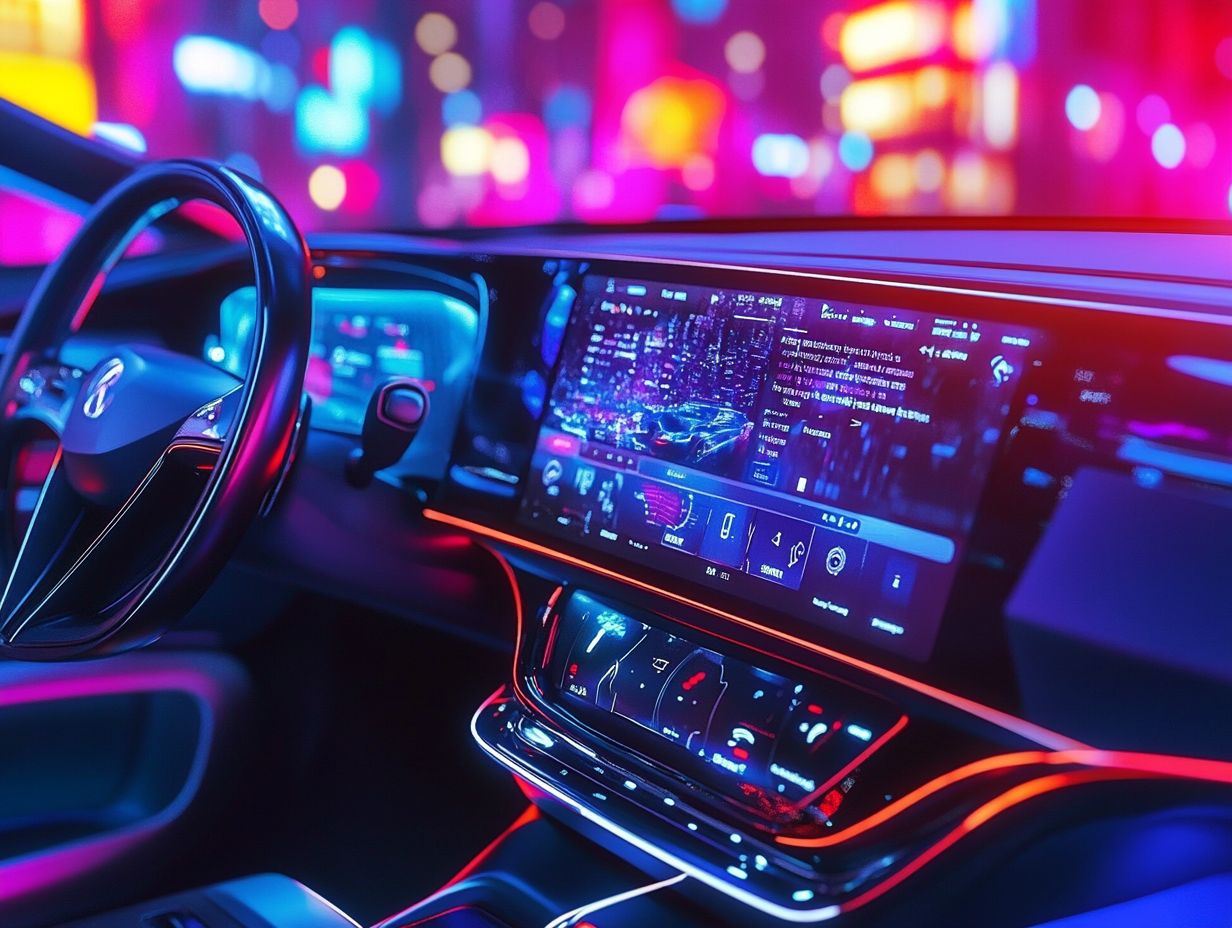What to Expect from New Car Features in 2024
As you step into 2024, the automotive landscape is evolving at an unprecedented pace.
Advancements are transforming your perspective on cars, from autonomous driving technologies that promise to revolutionize your commute to electric and alternative fuel vehicles that are reshaping your environmental impact.
Smart and connected cars are not only enhancing safety but also offering seamless integration with your digital life. Innovations in vehicle design are prioritizing efficiency and sustainability, ensuring a future that aligns with your values.
Dive into these groundbreaking features ready to redefine your driving experience.
Contents
- Key Takeaways:
- Autonomous Driving
- Electric and Alternative Fuel Vehicles
- Smart and Connected Cars
- Innovations in Vehicle Design
- Frequently Asked Questions
- What new car features can we expect to see in 2024?
- Will there be any new advancements in electric cars in 2024?
- What new safety features will be available in cars in 2024?
- Will autonomous cars be available for purchase in 2024?
- What changes can we expect to see in car design in 2024?
- How will new car features in 2024 impact the environment?
Key Takeaways:

- By 2024, expect to see fully autonomous cars on the road, bringing convenience and potentially reducing accidents.
- The rise of electric and alternative fuel vehicles is transforming the automotive industry and positively impacting the environment.
- Smart and connected cars will become the norm, with better safety features and technology integration for seamless driving.
Explanation of Advancements in Car Technology
Exciting changes are happening in the automotive industry! The industry is redefining your driving experience with cutting-edge innovations. From electric vehicles to better safety features and modern entertainment systems, the future of driving is looking incredibly exciting.
New cars today are not just about improved performance; they come equipped with better safety features, including automatic emergency braking and collision detection systems, ensuring the utmost protection for you and your passengers.
Electric vehicles are on the rise, thanks to their environmental friendliness and cost-efficiency. They help reduce your reliance on fossil fuels and come with lower maintenance needs, making them a smart choice.
The integration of driver assistance systems, like adaptive cruise control and lane-keeping technology, enriches your driving experience, allowing you to navigate with greater confidence and ease.
These technologies are advancing, with an emphasis on connectivity and software updates to keep your vehicle operating at peak performance. Modern cars have evolved into not just a mode of transportation but a smart, interactive extension of your lifestyle, offering you the latest amenities and conveniences.
Autonomous Driving
Autonomous driving signifies a transformative advancement in vehicle technology, giving cars the power to navigate and operate independently without the need for human intervention.
This remarkable innovation harnesses intricate algorithms and real-time data, ensuring both safety and efficiency on the road.
Overview of Self-Driving Cars
Self-driving cars represent the pinnacle of vehicle technology, operating autonomously through a sophisticated blend of advanced safety systems, special sensors, and artificial intelligence, all tailored to navigate complex environments with ease.
These vehicles come outfitted with an impressive array of special sensors think lidar, cameras, and radar that work seamlessly together to gather real-time data about their surroundings. This trove of information is then analyzed by sophisticated algorithms, enabling the car to detect obstacles, comprehend traffic laws, and make split-second decisions, much like a seasoned human driver would.
Thanks to smart technology that learns over time, these self-driving systems continuously refine their performance. This evolution could lead to safer roads for everyone while enhancing the overall driving experience. By eliminating human errors and distractions, this groundbreaking technology aspires to pave the way for safer, more efficient roadways.
Benefits and Challenges
The benefits of self-driving cars are compelling. You ll enjoy improved safety, less traffic congestion, and enhanced mobility, especially if you re unable to drive.
However, challenges like regulatory hurdles and the reliability of technology stand in the way of widespread adoption.
These innovative vehicles use advanced sensors and computer systems that can perform tasks that usually require human intelligence to navigate the roads. They hold the promise of dramatically reducing accident rates caused by human error, which makes up a substantial percentage of traffic incidents today.
Moreover, their ability to communicate with one another can create a more efficient traffic flow, ultimately cutting down on the time you spend in gridlock.
Yet, despite these enticing advantages, technological limitations remain. The need for impeccable software and the complexities of varied driving environments pose significant hurdles to rapid integration into existing systems.
Public acceptance is equally critical. Addressing concerns about safety, data privacy, and trust in automated decisions is essential for self-driving cars to earn widespread approval.
Electric and Alternative Fuel Vehicles

Electric and alternative fuel vehicles are revolutionizing the automotive industry. They present you with sustainable options that substantially lower emissions and champion environmental preservation.
These vehicles are not just about eco-friendliness; they also boast cutting-edge technology, such as hybrid powertrains, which combine a traditional engine with an electric motor, and advanced crash protection features. All are designed to elevate both performance and safety.
Impact on the Automotive Industry
The rise of electric vehicles has significantly transformed the automotive industry. Manufacturers are compelled to innovate and adapt to cutting-edge technologies.
This evolution has led to the introduction of updated models and performance settings that emphasize efficiency and sustainability.
This shift mirrors a growing environmental consciousness among consumers, signaling a broader transformation in automotive trends.
As interest in emissions-free driving intensifies, companies are re-evaluating their production methods, moving away from traditional combustion engines in favor of electrified powertrains.
As a result, advancements in battery technology and charging infrastructure have become crucial. These advancements address the increasing demand for longer ranges and quicker recharging options.
Your awareness of the benefits of electric vehicles such as lower operating costs and attractive government incentives is reshaping your preferences. This is steering you toward more sustainable choices in your purchasing decisions.
Environmental Benefits
Electric vehicles present you with remarkable environmental advantages. They significantly cut emissions and play a crucial role in the fight against climate change, promoting sustainability within the automotive sector.
By tapping into renewable energy sources like solar and wind power, these vehicles drastically reduce dependence on fossil fuels.
Their efficient operation leads to lower energy consumption, which helps improve air quality in urban areas.
Transitioning to electric and alternative fuel vehicles not only mitigates the harmful pollutants emitted by traditional gasoline cars but also spurs investments in sustainable infrastructure, such as charging stations powered by green energy.
As these innovative technologies evolve, they set the stage for a healthier planet. This highlights the automotive industry’s dedication to reducing its carbon footprint and championing eco-friendly practices.
Smart and Connected Cars
Smart and connected cars are transforming your relationship with vehicles. They leverage cutting-edge technology and sophisticated infotainment displays.
These innovations deliver real-time navigation instructions, entertainment options, and enhanced communication features. All are designed to create a more seamless and integrated driving experience for you.
Imagine stepping into a car that drives itself!
Integration of Technology into Vehicles
The integration of technology into vehicles has ushered in an era of smarter cars. These cars are equipped with advanced infotainment systems and cabin technology that elevate your driving experience and ensure seamless connectivity.
Modern vehicles now flaunt features like voice recognition, touch screen controls, and smartphone integration, giving you the power to access navigation, music, and communication with effortless ease. This transformation promotes hands-free convenience and significantly enhances your overall driving satisfaction, allowing you to stay focused on the road ahead.
Adaptive systems that learn from your preferences personalize each journey, creating a more enjoyable driving atmosphere tailored just for you. Enhanced safety technologies protect passengers and create a more engaging ride, underscoring the vital role that innovative technology plays in shaping the future of automotive experiences.
Enhanced Safety Features

Enhanced safety features in modern vehicles encompass advanced crash protection and innovative driver assistance systems. These systems work in harmony to elevate overall vehicle safety and significantly reduce the risk of accidents.
These systems are designed to reduce the impact of collisions and actively prevent them. For example, automatic emergency braking, lane-keeping assist, and adaptive cruise control add an extra layer of security, giving you the power to maintain better control on the road.
Technologies like blind-spot monitoring and rear cross-traffic alerts keep you informed about potential hazards that may not be immediately visible, enhancing your situational awareness. These advancements reflect a steadfast commitment to fostering a safer driving environment for everyone on the road.
Innovations in Vehicle Design
Exciting innovations in vehicle design are revolutionizing how new cars look and perform! Updated models now prioritize passenger space and comfort, seamlessly integrating sleek, modern luxury SUV designs that cater to a diverse array of drivers.
Sleeker and More Efficient Designs
Sleeker and more efficient designs in vehicles enhance not only visual appeal but also aerodynamics. This significantly boosts performance and fuel efficiency in new cars.
These modern shapes work wonders by minimizing air resistance, allowing you to cut through the air with ease. The result? You ll enjoy enhanced acceleration and a smoother ride, translating into longer travel distances on a single tank of gas.
Manufacturers are also incorporating lightweight materials, amplifying these benefits by reducing overall weight without compromising safety or durability.
By prioritizing these sleek designs, automotive companies focus on more than just aesthetics; they re engineering a future where performance and ecological responsibility coexist, ultimately benefiting you and the environment alike.
Use of Sustainable Materials
The incorporation of sustainable materials in vehicle design signifies a commitment to environmental protection. This enables manufacturers to develop eco-friendly cars that don t skimp on quality or aesthetics.
This transition boosts the overall appeal of vehicles and addresses your desire for greener alternatives.
By integrating materials like recycled plastics, natural fibers, and bio-based composites, automotive designers significantly reduce the carbon footprint linked to production and disposal. These innovative materials often provide enhanced durability and performance, meeting industry standards with ease.
Ultimately, these carefully selected materials promote energy efficiency throughout the vehicle’s lifecycle, emphasizing the importance of sustainability as a core principle in contemporary automotive innovation. Choose eco-friendly options when considering your next vehicle purchase!
Frequently Asked Questions
What new car features can we expect to see in 2024?

In 2024, we can expect more electric and self-driving cars on the road, as detailed in our article on what to expect from the 2024 SUV market. Safety technology will also advance, including driver-assist features and crash avoidance systems.
Will there be any new advancements in electric cars in 2024?
Yes! By 2024, electric vehicles will likely have longer ranges and faster charging thanks to better battery technology.
What new safety features will be available in cars in 2024?
Cars will offer advanced features like lane departure warnings and adaptive cruise control. Automatic emergency braking systems will also see improvements.
Will autonomous cars be available for purchase in 2024?
Get ready! By 2024, fully self-driving cars may hit the market, though a human driver likely needs to be present.
What changes can we expect to see in car design in 2024?
In 2024, we might see sleeker, more aerodynamic designs that improve fuel efficiency. Expect a switch to more sustainable materials in car production, too.
How will new car features in 2024 impact the environment?
Advancements in electric and self-driving cars could lead to lower emissions and cleaner air. Using eco-friendly materials in production will further benefit the environment.






